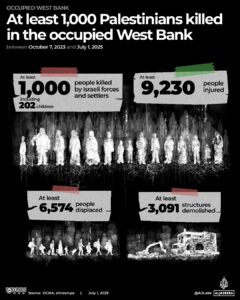
The National Interest Foundation Newsletter
Issue 298, August 22, 2025
Welcome to our NIF Newsletter. In this week’s edition, we delve into how Israel is accelerating building illegal settlements in the West Bank while the world’s attention is on Gaza and explore the Lebanese government’s decision to disarm Hezbollah and the realities on the ground.
Editor: Bassam Tarbush
Israel is Accelerating Building Illegal Settlements in the West Bank While the World’s Attention is on Gaza

In addition to plans to build more illegal Israeli settlements in the occupied West Bank, there has also been a skyrocketing of settler violence and attacks. (Photo from Wikimedia Commons)
With much of the world’s focus and outrage directed at the appalling human rights abuses unfolding in Gaza, it has become increasingly important to not lose sight of the violations that are also taking place in the West Bank at an alarming rate. Since the onset of the Gaza War, there has been a significant uptick in plans for building new illegal settlements and most concerningly, a growing prevalence of state-backed settler violence and attacks. This has consisted of harassment, property destruction, physical assaults, and even murders, and has seen an unprecedented number of Palestinians killed at the hands of settlers and Israeli forces – including many Americans. Rights groups have documented the troubling development, recently unveiling that at least 750 settler attacks have been committed against Palestinians and their property in the first half of 2025 alone – representing the highest monthly average since the recording of this data began almost 20 years ago. Analysts have noted that the spike has clearly been motivated by a number of factors such as global attention elsewhere, Israeli authorities’ enabling and emboldening of the behavior, and the complete lack of accountability for these criminal acts – all demonstrating the systematic and calculated nature of the phenomenon as well. As a result, observers contend that Israeli forces and illegal settlers in the West Bank are currently carrying out one of the most violent campaigns of land grabbing and intimidation in decades.

Chart from the United Nations Office for the Coordination of Humanitarian Affairs (OCHA), Shireen.ps, and Al Jazeera
In total, over 1,000 Palestinians in the West Bank have been killed by Israeli forces and settlers since the onset of the Gaza War. There have been several Palestinian-American victims as well, with prominent recent cases including those of Sayfollah Musallet and Khamis Ayyad – both murdered as a result of Israeli settler violence that continues to go unpunished. The number of those injured or killed in these attacks has more than doubled in June and July 2025, compared to previous months. Additionally, the more than 750 settler attacks against Palestinians since January alone is a 13 percent rise from 2024, according to UN rights organizations. This is particularly disturbing considering that last year in 2024, there were already a record high number of incidents of settler violence (over 1,400) which exceeded that of the previous largest documented total from 2023. As such, should this trend continue over the latter half of 2025, that would mark three consecutive years of newly set highs in occurrences of settler violence.

Chart from Peace Now, HaMoked, and Al Jazeera
On top of the rise in settler violence, there has also been a huge increase in unlawful Israeli land seizures and the number of illegal settlements and outposts, with peace activist groups documenting that the amount of both the land grabs and settlements/outposts built between 2023 and now surpasses that of the previous two decades combined. One of the latest plans for further illegal settlement expansion to draw widespread international condemnation was the E1 area project, which Israeli authorities gave final approval for this week. The planned settlement would in essence divide the occupied West Bank into northern and southern regions – hindering the potential establishment of a contiguous Palestinian state. For many analysts, this plan is purposefully being pushed now, in large part due to the recent growing number of countries that have announced their intent to formally recognize a Palestinian state – which has included France, Australia, the United Kingdom, Canada, and others. In fact, current Israeli government officials have openly acknowledged that the E1 and the continued expansion of illegal settlements is a response to these moves and is aimed at preventing the feasibility of a Palestinian state. Israel’s approval of the E1 plan also highlights how pervasive and out in the open support for blatant violations of international law have become under the current government, as well as the degree to which it seeks to defy the global community.
While illegal Israeli settlement expansion plans like the E1 project have elicited universal denunciation, the one notable absence from this has been Trump administration officials. U.S. Ambassador to Israel Mike Huckabee stated that the United States would not oppose it, remarking that the plan “was not a violation of international law” despite worldwide agreement to the contrary. Harmful and dangerous rhetoric such as this from Huckabee amounts to complicity in Israel’s illegal actions and undoubtedly emboldens the continuation of these violations, which are the major obstacle to peace. This is precisely why illegal Israeli settlement development in the E1 area was previously frozen due to pressure from past U.S. administrations and countries in Europe. However, now, a failure to hold the Israeli government accountable for its repeated egregious human rights abuses, war crimes, and breaches of international law has opened the door for more of these to be committed.
Lebanese Government’s Decision to Disarm Hezbollah and the Realities on the Ground

Following the decision, the Lebanese Army has been tasked with producing the disarmament plan in the coming weeks to then present to the Cabinet for discussion and approval. (Photo from AFP)
Back in early August, the Lebanese government voted to endorse a U.S.-backed plan outlining a four-phase roadmap and set of objectives which seeks the disarmament of Hezbollah by the end of the year in addition to a cessation of Israeli military attacks and a withdrawal of its troops from southern Lebanon. The decision has called on the Lebanese Armed Forces (LAF) to put together a detailed plan for this that will then be presented to the government for expected approval in either late August or early September. While this process unfolds, there are some key factors that will ultimately determine whether or not the plan is successfully implemented. One of these is the reality of the situation on the ground in Lebanon, and the importance of preventing external political actors from undermining the Lebanese government’s attempts at state building and stabilization. Analysts have pointed to continued Israeli aggression as having a harmful impact on the prospect of carrying out the plan, and it remains to be seen if this can be curtailed by mediating parties such as the United States.
After meeting with Lebanese officials earlier this week, U.S. Special Envoy Tom Barrack himself emphasized the need for Israel to comply with the stipulations laid out in the plan for it to have any chance of success moving forward. To date, Israeli forces have not only failed to fully withdraw from southern Lebanon – something which was supposed to occur as a part of the November 2024 ceasefire agreement with Hezbollah – but on top of this, they have also been carrying out near-daily violations of the truce and have continued these attacks on Lebanon even in the weeks since the early August Lebanese government’s approval of the disarmament plan. Experts have contended that Hezbollah will likely insist on not agreeing to hand over its arms unless Israel stops launching attacks and withdraws from illegally occupied Lebanese territories. However, if Israel was to do so, there is strong reason to believe that Hezbollah would be willing to consider merging its weaponry into the Lebanese state’s control. Thus, Israel is viewed as the biggest obstacle to potential implementation of the plan, and there is a need to above all put an end to Israeli aggression and violations of Lebanese sovereignty for anything else to take place thereafter.
Lebanese government officials have highlighted the necessity of this, imploring the United States to fulfill its responsibility in pressuring Israel to halt its hostilities and encroachments. Doing so would create stable domestic conditions that allow the Lebanese government to deal with Hezbollah as should be the case: as a matter of internal affairs and integration. Lebanon’s stability and the legitimacy of its new government – both locally and to the outside world – must be the issue of first and utmost importance if any multi-phased disarmament plan is to have a chance of successful implementation. This requires forcing Israel to end its illegal occupation of sovereign Lebanese territory as well as ceasing attacks and attempts to undermine Lebanon’s state building and reconstruction in order to truly propel the process to move forward. As many have drawn attention to, the United States has the means and the opportunity to play a positive role in bringing this about.
The most effective way to try to build a stable Lebanese state would be to put an end to destructive external interference from Israel and give the new government the ability to bolster its legitimacy. This could be aided by efforts to support the economic reconstruction of the country through the offering of tangible incentives as it navigates the current nascent political stage. Chiefly, it is critical that U.S. officials use their leverage over Israel to compel its adherence to the needed circumstances on the ground in southern Lebanon which would give the Hezbollah disarmament plan the greatest likelihood of being implemented. On this note, there have been recent reports suggesting that Trump administration officials are discussing steps with the Israeli government that the latter should take given the Lebanese government’s ongoing efforts – including a step-by-step Israeli withdrawal from its five positions in southern Lebanon – but whether or not these actually come to fruition is yet to be determined.
